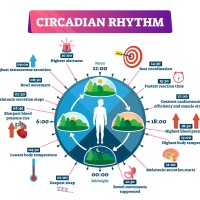Introduction:
Have you ever wondered why you feel more energetic and alert during certain times of the day while feeling sleepy and sluggish at others? Or why your body seems to follow a daily routine even without you consciously trying to maintain one? The answer lies in a fascinating biological phenomenon known as the circadian rhythm.
In this blog post, we will delve deep into the world of circadian rhythms, exploring what they are, how they work, and why understanding them is crucial for your overall health and well-being.
What Are Circadian Rhythms?
Circadian rhythms are 24-hour internal biological clocks that regulate various physiological and behavioral processes in living organisms. The term "circadian" is derived from the Latin words "circa," meaning "around," and "dies," meaning "day." These rhythms are responsible for coordinating our body's functions with the natural day-night cycle.
How Do Circadian Rhythms Work?
The primary driver of circadian rhythms in humans and many other organisms is the suprachiasmatic nucleus (SCN), a tiny cluster of cells located in the hypothalamus of the brain. The SCN receives input from light-sensitive cells in the retina of the eye, which helps it synchronize our internal clock with the external environment. When exposed to light, especially natural daylight, the SCN sends signals to various parts of the body to regulate activities such as hormone release, body temperature, and alertness.
Throughout the day, circadian rhythms influence:
Sleep-Wake Cycle: Your body's internal clock helps determine when you feel most awake and when you naturally tend to sleep. Disruptions to this cycle, such as shift work or jet lag, can lead to sleep problems and a general feeling of malaise.
Hormone Production: Hormones like cortisol (the stress hormone) and melatonin (the sleep hormone) are regulated by circadian rhythms. These hormones play a significant role in your overall health and well-being.
Digestion: Circadian rhythms affect the functioning of your digestive system, which is why you may find it easier to digest a meal at certain times of the day.
Body Temperature: Your body temperature tends to be at its lowest in the early morning hours and highest in the late afternoon or early evening, thanks to circadian rhythms.
Why Understanding Circadian Rhythms Matters:
Improved Sleep Quality: By aligning your daily schedule with your circadian rhythm, you can enjoy better sleep quality and feel more refreshed upon waking.
Enhanced Productivity: Knowing your peak alertness times can help you schedule tasks that require high concentration during those periods, leading to increased productivity.
Better Hormonal Balance: Circadian rhythms influence hormone production, so a well-regulated internal clock can lead to better hormonal balance and overall health.
Mood and Mental Health: Disruptions to circadian rhythms have been linked to mood disorders like depression and bipolar disorder. Understanding and maintaining a regular circadian rhythm may contribute to better mental well-being.
Tips for Optimizing Your Circadian Rhythms:
Establish a Consistent Sleep Schedule: Go to bed and wake up at the same time every day, even on weekends.
Get Exposure to Natural Light: Spend time outdoors, especially in the morning, to help synchronize your internal clock with the natural day-night cycle.
Limit Screen Time at Night: The blue light emitted by screens can disrupt your circadian rhythms. Reduce screen time before bedtime for better sleep.
Watch Your Diet: Avoid heavy meals close to bedtime, as digestion is less efficient at night.
Stay Active: Regular exercise can help regulate your circadian rhythms, but avoid strenuous workouts too close to bedtime.
Conclusion:
Your circadian rhythm is like an internal conductor orchestrating various bodily functions. Understanding and respecting this natural timekeeper can lead to better sleep, improved health, and enhanced productivity. By aligning your daily routine with your body's internal clock, you can unlock the potential for a healthier, more balanced life. So, embrace your circadian rhythm and let it guide you to a more harmonious and fulfilling daily life.



